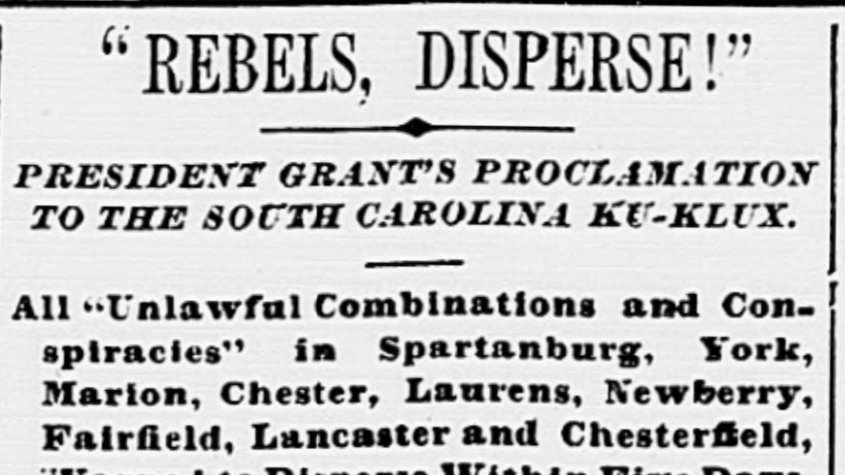American History
Related: About this forumOn October 12, 1871, Pres. Grant took the first step to suspending habeas corpus in South Carolina.
Tue Oct 12, 2021: On this day, October 12, 1871, Pres. Grant took the 1st first step to suspending habeas corpus in
Kevin M. Kruse Retweeted
https://chroniclingamerica.loc.gov/lccn/sn84026994/1871-10-13/ed-1/seq-1/
Link to tweet

marble falls
(71,340 posts)Habeas Corpus Suspension Act (1863)
From Wikipedia, the free encyclopedia
(Redirected from Habeas Corpus Suspension Act 1863)
Habeas Corpus Suspension ActGreat Seal of the United States
Long title An Act relating to Habeas Corpus, and regulating Judicial Proceedings in Certain Cases
Citations
Statutes at Large 12 Stat. 755
Legislative history
Introduced in the House of Representatives as H.R. 591, A bill to indemnify the President and other persons for suspending the privilege of the writ of habeas corpus, and acts done in pursuance thereof by Thaddeus Stevens on December 5, 1862 consideration by House Judiciary, Senate Judiciary
Passed the House of Representatives on December 8, 1862 (90–45)
Passed the Senate on January 28, 1863 (33–7)
by the joint conference committee on February 27, 1863; agreed to by the House of Representatives on March 2, 1863 (99–44) and by the Senate on March 2, 1863 (voice vote)
Signed into law by President Abraham Lincoln on March 3, 1863
Major amendments
14 Stat. 46 (1866), 14 Stat. 385 (1867)
United States Supreme Court cases
ex parte Vallandigham, 68 U.S. (1 Wall.) 243 (1864)
ex parte Milligan, 71 U.S. (4 Wall.) 2 (1866)
The Habeas Corpus Suspension Act, 12 Stat. 755 (1863), entitled An Act relating to Habeas Corpus, and regulating Judicial Proceedings in Certain Cases, was an Act of Congress that authorized the president of the United States to suspend the right of habeas corpus in response to the American Civil War and provided for the release of political prisoners. It began in the House of Representatives as an indemnity bill, introduced on December 5, 1862, releasing the president and his subordinates from any liability for having suspended habeas corpus without congressional approval.[1] The Senate amended the House's bill,[2] and the compromise reported out of the conference committee altered it to qualify the indemnity and to suspend habeas corpus on Congress's own authority.[3] Abraham Lincoln signed the bill into law on March 3, 1863, and suspended habeas corpus under the authority it granted him six months later. The suspension was partially lifted with the issuance of Proclamation 148 by Andrew Johnson,[4] and the Act became inoperative with the end of the Civil War. The exceptions to his Proclamation 148 were the States of Virginia, Kentucky, Tennessee, North Carolina, South Carolina, Georgia, Florida, Alabama, Mississippi, Louisiana, Arkansas, and Texas, the District of Columbia, and the Territories of New Mexico and Arizona.